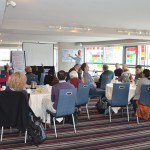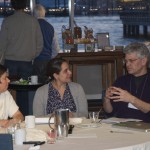This past weekend, January 24-25, nineteen members of the Engaging Mathematics leadership team, including the partners, advisory board representatives, consultants, and Co-PIs, met in Jersey City, New Jersey to formally begin work on how to “make mathematics relevant to students’ lives, to connect mathematics learning to the goals and interests that students bring to college, and to show how mathematics relates to other disciplines, important civic questions, and technological challenges.”
On the first day of the meeting, the partners from the lead institutions shared and discussed details about the math curricula they had developed, including their intended audiences, the civic topics covered, and the expected rollout of each course or module. Attendees discussed strategies to expand the community of practice by reaching out to peers through academic meetings and conferences. An action planning workshop led by facilitator Jonathan Bucki helped stakeholders to specifically plot activities over the three years of the grant.
Attendees were joined by cadets from the United States Military Academy who shared their experiences with math courses that include civic issues. The cadets also demonstrated mathematical modeling on topics such as power battery loadouts for US soldiers, and the relationships between their costs and weights. Dr. Rikki Wagstrom of Metropolitan State University discussed how she incorporated the Scholarship of Teaching and Learning (SoTL) into her “Mathematics of Sustainability” course.
The second day of the meeting focused on assessment and evaluation. The independent evaluator for Engaging Mathematics, Leo Gafney, discussed his plans and methods for evaluating the project outcomes. Later, Stephen Carroll of Santa Clara University discussed guidelines and best practices for the Student Assessment of Learning Gains (SALG), which will be used to evaluate student progress in the courses.
“It was wonderful to see the enthusiasm of the project’s faculty members from different institutions as they worked together on planning and as they shared their ideas about teaching mathematics through a variety of civic issues, including environmental sustainability, energy consumption, water resources, and other topics related to local, regional or national needs. I am optimistic that the work the ‘Engaging Mathematics’ faculty are doing will be shared and serve as models (whether full courses or modules that can be used in a course) for the wider SENCER and national mathematics communities,” said Ellen Mappen, an NCSCE consultant with the project.
Following the meeting, Dr. Lynn Gieger of Oglethorpe University, a partner in Engaging Mathematics, shared that, “I came away from the weekend with a much better sense of the larger project as well as our particular role in it.” Dr. Chris Arney, professor of math and Chair of Network Science for the United States Military Academy and member of the advisory board, noted, “I do believe I was re-SENCERized.”
A page focusing on Engaging Mathematics activities and resources is now live here. Over the course of the project, a separate website will be developed and linked to this page. Visitors will be able to peruse the types of courses planned to be enhanced or developed, and additional features will be added to the site to allow project partners to share details on their course development, and once available, the results of course implementations. To learn more about the Engaging Mathematics initiative, please click here.
Article originally published by Kyle Simmons and Christine Marie DeCarlo on January 30, 2014.



